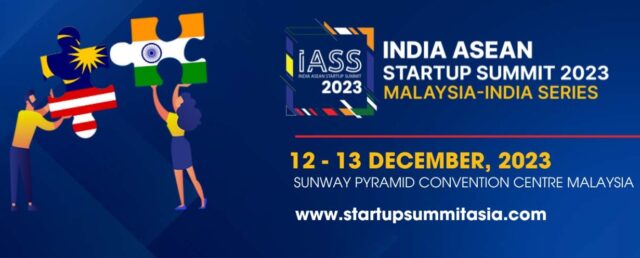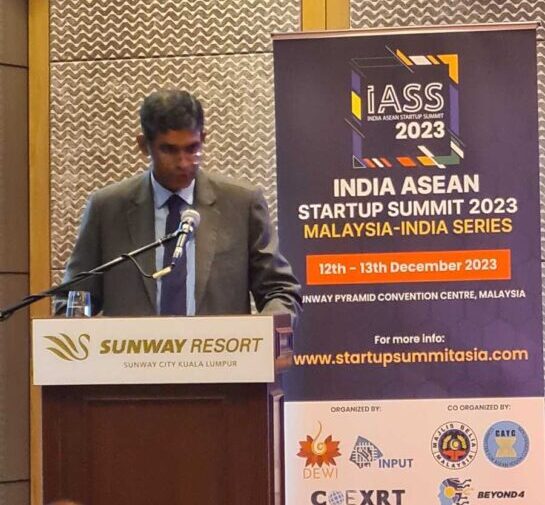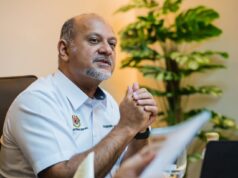

INDIA-MALAYSIA STARTUP COLLABORATION
POWERED BY DRIVERS OF #NEWINDIA
Press Statement by His Excellency B.N.Reddy
High Commissioner of India
India-ASEAN Startup Summit (IASS)
Kuala Lumpur will host the first India-ASEAN Startup Summit (IASS) on 12-13 December 2023 at Sunway Pyramid Convention Centre focusing on collaboration of Startups from India with their counterparts in Malaysia as well as other countries in ASEAN, with Malaysia as the hub for Startups from India. Thirty-five (35) Startups from India, including unicorns, led by Startup India under the Department of Investment and Internal Trade (DPIIT) of India, Department of Science & Technology (DST) of India supported by Indian Institute of Technology (IIT) Kanpur and T-Hub from Hyderabad, are participating in the Summit. Over 600 participants with 160 from Startups, several Startup hubs/incubators, accelerators and government officials are participating in the India-ASEAN Startup Summit 2023.


The 35 Indian participating Startups at IASS represent diverse sectors of relevance to India, Malaysia and the ASEAN region. They represent the latest innovations in sectors such as ESG, waste management, Generative AI, aviation and space technologies, edu-tech, health-tech. The presence of Indian Startups in Malaysia in such large numbers, presents a unique opportunity for Malaysian businesses to forge beneficial collaborations and for Malaysian investors to look for attractive investment opportunities. Presence of Startup ecosystem/accelerators such as T-Hub, Startup Innovation and Incubation Centre at IIT Kanpur, Venture Centre at Pune, Science & Technology Entrepreneurial Park at Coimbatore will enrich the Summit. DPIIT, DST and Startup India will bring their unique perspectives on policy making.
Startup Revolution in New India
The unprecedented growth of Startups in India – now ranking third globally, with 116,000 recognized Startups and 111 unicorns with valuation of over USD 350 billion, provides the perfect backdrop for a productive engagement during the IASS of all stakeholders in the Startup ecosystem – Startup founders, venture capitalists, policymakers, accelerators and incubators.
The Startup revolution in India is amongst the most visible manifestations of Prime Minister of India Narendra Modi’s vision announced in January 2016 to transform India into a country of job creators instead of job seekers, through the launch of Government of India’s Startup India initiative. This Startup India vision catalysed Startup culture and built a strong and inclusive ecosystem of innovation and entrepreneurship in India. It is backed by the development of Digital Public Infrastructure (DPI) comprising ‘Digital India’ initiative- a sustained push towards improving digital infrastructure through ‘India Stack’- a collection of comprehensive technology applications covering digital identity, digital payment through Unified Payment Interface (UPI) and personal data-management system without compromising privacy; BharatNet initiative- connecting rural India with high speed broadband; empowering citizens with digital literacy programs like Digital Saksharta Abhiyan (DISHA), and increasing adoption of e-Governance initiatives at population scale.
Since 2014, broadband connections have grown substantially, up from 61 million in 2014 to 832 million at end of 2022. Smartphone users have gone from 150 million to over 750 million. In terms of innovation growth, patent applications filed by Indians grew by 31.6% to 55,718 in 2022 – a growth unmatched globally.
The New India is not only providing a level playing field for fair competition but also creating a more inclusive digital economy. Under India’s Presidency, G20 accepted India’s plan to build and maintain a Global Digital Public Infrastructure Repository, a virtual repository of DPI, to be voluntarily shared by the G20 members and beyond, to drive a mutually beneficial ecosystem. In this context, India is prepared to share its DPI expertise to promote financial inclusion and productivity to Malaysia and to the larger Global South.
India and ASEAN: Towards an Inclusive Digital Economy
A right step in this direction is the decision to enhance, inter-alia, cooperation on digital economy, fintech and Startups between India and ASEAN, as enshrined in the Joint Statement on ASEAN -India Comprehensive Strategic Partnership adopted in 2022 on occasion of the 30 years of the India-ASEAN Dialogue Partnership.
On the occasion of 75th anniversary of India’s Independence in 2022, Prime Minister Narendra Modi urged the people of India to take five pledges, including making India a developed nation by 2047. The dawn of the New India is backed by strong and credible growth indicators. India’s economy is expected to grow 7% in the current fiscal year. As per IMF forecasts, India is projected to emerge as the world’s third largest economy by 2027 from its current fifth position.
The New India is a promising global ‘bright spot’ and continue to contribute to global growth and innovation. India’s recent successful G20 Presidency, successful Chandrayaan-3 landing on the lunar South Pole, its human-centric and sustainable development oriented foreign policy leadership amidst global geo-political crisis, demonstrates its inherent capacities to be a credible voice of the Global South.
It is in this backdrop that the first India-ASEAN Summit in Kuala Lumpur promises an excellent opportunity for developing a vibrant Startup ecosystem between India and Malaysia, and for Malaysia to become a strong hub for its expansion into the broader ASEAN region.










